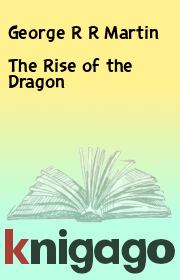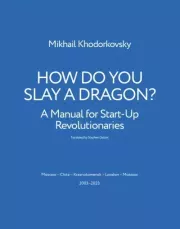Mikhail Khodorkovsky - How Do You Slay A Dragon
Название: | How Do You Slay A Dragon | |
Автор: | Mikhail Khodorkovsky | |
Жанр: | Старинная литература | |
Изадано в серии: | неизвестно | |
Издательство: | неизвестно | |
Год издания: | 2022 | |
ISBN: | неизвестно | |
Отзывы: | Комментировать | |
Рейтинг: | ||
Поделись книгой с друзьями! Помощь сайту: донат на оплату сервера | ||
Краткое содержание книги "How Do You Slay A Dragon"
Right at the start of this book, I had a great surprise. I know Mikhail Khodorkovsky’s story well. I reported for the BBC on his rise to prominence in the YUKOS oil company, his disputes with the newly-elected Russian President, Vladimir Putin, in the first years of the twenty-first century, and his arrest on trumped-up charges in October 2003 and subsequent imprisonment. Four days after his arrest I was due to have a meeting with him in Moscow. Instead, a meeting was arranged with a representative of the Russian Prosecutor’s Office to explain the arrest. The trial hadn’t yet begun. But the outcome was already evident.
К этой книге применимы такие ключевые слова (теги) как: Политика и события
Читаем онлайн "How Do You Slay A Dragon". [Страница - 5]
Why is the issue of federalism so important for Russia? It’s because with its cultural, religious and, of course, economic pluralism, Russia can be a unified state only under the cruellest of dictatorships, which crushes and levels out all local characteristics. Without such a dictatorship it’s impossible to bring under a single denominator places such as Moscow and Grozny; Kazan and Magadan; Kaliningrad and Khabarovsk; St Petersburg and Kemerovo. If we wish to have even a hint of democracy in Russia, we must allow for the existence of pluralism; and not simply economic, but political, too. Incidentally, the Russian Empire that is so revered by Putin’s followers was politically pluralistic. For centuries the European system of self-governance in Finland existed alongside the khanates of the Middle Ages that ruled Central Asia. Democracy in Russia means pluralism; and in modern times political pluralism can be achieved only through federalism.
Achieving this, however, is no easy task. Why is it that Russia has always been an overly-centralised state? Because if the centre showed any weakness and handed any significant autonomy over to the regions, petty little tsars would rise up in these regions, each of whom would prove to be greedier and more evil than the tsar in Moscow. So the people would ask Moscow to help defend them from these local satraps and the bandits whom they cultivated around them. And the power of the centre always relied on this. A weak tsar led to strong petty tsars; and a strong tsar meant the petty tsars were weak. How can this vicious circle be broken?
There is a way out. We need to introduce a third element, a force that is independent of these two extremes. This is something that everyone knows very well, because it’s the very force that in recent years the Putin regime has been trying above all else to crush. It is local self-government. A regional governor who’s taken power into his own hands while the centre was looking the other way, can be stopped by an independent and self-sufficient mayor or head of a local administration. If the local authorities limit the powers of the petty tsar, he or she will be obliged to become a regional constitutional monarch. And if not, the local authorities will instinctively seek the support of Moscow, thus strengthening central government. This will help to even out the system, because it will bring in the checks and balances that are essential for creating a genuine democracy.
The space for an independent judiciary arises only when this triangle of the local authorities, regional governor and central government is developed. By definition, the relationship between the parties cannot be ideal. There will either be constant war between them, or there will have to be an arbiter acceptable to all. It is absolutely impossible for there to be an independent legal system if the need for it is not recognised by the stronger side. Apart from the united local elites, there is no strong side in modern Russia: they’ve all been squeezed out. The centre, the regions and the local authorities will need rules and an arbiter who can watch over them all. In such a situation, perhaps the idea of a genuine independent judiciary might take root in Russia for the first time.
The arrival of a proper system of justice will mark the start of a gradual massive change in the relationship between the citizen and the state, and will create the conditions for the restoration (or, to be more accurate, building once more from scratch) of civil society in Russia. Progress in this will lead eventually to the final result: freedom, human rights, free and fair elections based on political competition, and stable institutions that support a state governed by the rule of law. But all of this and much more besides will not come all at once. Such an outcome can be achieved only by following a chain of events step by step. And the most important link in this chain, I believe, is the path to a parliamentary republic.
It is specifically this path – and not “the battle with a bloody regime” – that represents my goal, the pursuit of which has drawn me into politics. But the move towards it will not be swift and will require a great deal of patience.
Unfortunately, defining precisely the goal towards which we’re heading doesn’t guarantee that we’ll end up exactly where we want to be. We have to be aware of what lies ahead of us on this path. Clearly, we cannot expect anything good to come from the starting point to where Putin and his friends have brought us. Many of the prerequisites that are essential for the establishment of democracy in Russia simply don’t exist. This is often ignored by many very honourable people, who are idealists in the best sense of the word, and who really want things to be better…but in the depths of their souls they realise that things will simply be the same as they always have been. On the one hand, we have a terror machine served by an enormous number of functionaries who won’t give up their positions even after Putin goes. And on the other, we have a frightened society that has been oppressed by this terror, has lost its reliable social connections and is accompanied by a quantitatively reduced and qualitatively degraded elite. Obviously, we’re not going to be able to clear this ravine in one leap. We cannot avoid a period of transition during which the hangers-on from Putin’s old society will try to suppress us, while the growth of a new society will begin. This idea is there for all to see, yet as a rule it’s ignored in the general discussion about Russia’s future. But from the practical point of view it is the structure of society in this period of transition that’s the most pressing issue today.
The point is that any kind of transition in Russia, no matter from where and to where, is like being in a dense forest, in which it’s easier to lose oneself forever than it is to escape from it. What’s more, no one has yet managed to escape from it in the exact place where they’d planned to. This is why the period of transition has to be regarded very seriously. We can be sure of only one thing: the time available for the post-Putin period will be very limited. It must not last for more than two years, because that’s all the time it will take for whatever political force takes Putin’s place to gain people’s trust. If the transitional, or temporary, government manages to survive for two years, then one of two things will happen. Either it will have to introduce a cruel dictatorship for an unspecified length of time; or it’ll be swept away by the people. This is because during the period of transition it will be essential for the government to introduce a whole host of unpopular measures in the most difficult of circumstances. And this is even before we take into account such complicating factors as the resistance of the old ruling clans and the likely fall in the standard of living that accompanies virtually every revolution. A compromise must be reached with society.
Thus, it is essential to construct a reliable institutional framework for democracy in Russia. In my view this means creating a parliamentary
--">Книги схожие с «How Do You Slay A Dragon» по жанру, серии, автору или названию:
 |
| George R R Martin - The Rise of the Dragon Жанр: Старинная литература Год издания: 101 |
 |
| Mikhail Khodorkovsky - HOW DO YOU SLAY A DRAGON? Жанр: Старинная литература Год издания: 2022 |


